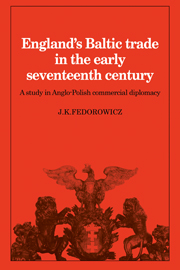 England's Baltic Trade in the Early Seventeenth Century
England's Baltic Trade in the Early Seventeenth Century Published online by Cambridge University Press: 05 November 2011
The purely economic crisis represented by the depression of 1620 was exacer-bated by a series of political problems which probably further undermined Polish purchasing power. Whatever the ultimate effects of the Polish–Ottoman war, the English government felt that it was in its interest to mediate in the dispute and Sir Thomas Roe was sent to the Sublime Porte to assist in restoring peace to southeastern Europe.
While Poland was engaged in defending its southern frontiers, Sweden used the opportunity to overcome the weakened Polish defences in Livonia. The key to the province was Riga which fell after a brief siege, while European opinion generally condemned the cynicism of Gustav Adolf in taking advantage of Poland's difficulties with the enemies of Christendom. James wrote a letter to the Swedish king urging him to abstain from an attack on Poland which in the event would be unworthy of a Christian ruler, and similar sentiments were echoed even by other Protestant princes. With the fall of Riga, there was little the Poles could do to stem the inexorable Swedish advance and within a few years the province was almost entirely in Swedish hands. Livonia itself was at this time of only limited importance in the commerce of the Baltic, but its conquest merely whetted Gustav Adolf's appetite for the more lucrative trade of the Prussian coast.
The worst effects of economic depression were over by 1624. From 1621 poor harvests in England stimulated demand for Polish grain and, with this return commodity now marketable, English shipping through the Sound rose appreciably, as can be seen in table 9.7 (pp. 170–1).
To save this book to your Kindle, first ensure no-reply@cambridge.org is added to your Approved Personal Document E-mail List under your Personal Document Settings on the Manage Your Content and Devices page of your Amazon account. Then enter the ‘name’ part of your Kindle email address below. Find out more about saving to your Kindle.
Note you can select to save to either the @free.kindle.com or @kindle.com variations. ‘@free.kindle.com’ emails are free but can only be saved to your device when it is connected to wi-fi. ‘@kindle.com’ emails can be delivered even when you are not connected to wi-fi, but note that service fees apply.
Find out more about the Kindle Personal Document Service.
To save content items to your account, please confirm that you agree to abide by our usage policies. If this is the first time you use this feature, you will be asked to authorise Cambridge Core to connect with your account. Find out more about saving content to Dropbox.
To save content items to your account, please confirm that you agree to abide by our usage policies. If this is the first time you use this feature, you will be asked to authorise Cambridge Core to connect with your account. Find out more about saving content to Google Drive.